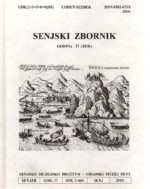Crveno vs. crno – Utjecaj politike na život stanovnika lovinačkog kraja kroz prizmu kolektivnog sjećanja
Red versus black – the political Influences on the Lives of the Residents of the Lovinac Region through the Prism of Collective Memory
Author(s): Mihovil GotalSubject(s): Political behavior, Politics and society, Cultural Anthropology / Ethnology, Culture and social structure , Nationalism Studies, WW II and following years (1940 - 1949), Transformation Period (1990 - 2010), Politics and Identity, Wars in Jugoslavia
Published by: Senjsko muzejsko društvo i Gradski muzej Senj
Keywords: collective memories; Lovinac region; World War Two; ND (Independent State of Croatia); NOB (Yugoslav people's national liberation struggle); political identity; political mobilisation; Social Federal;
Summary/Abstract: Presented in this paper are ethnological materials on the collective memory amongst the residents of the Lovinac region towards conflict and division in the period of WWII and their consequences in the periods of the Social Federal Republic of Yugoslavia and the Republic of Croatia. Collected from the personal narratives of interviewees the structure emphasises the vision and interpretation of past events by the local population and especially their political opinions and thoughts which are very strongly linked to memory. The transfer of these memories is initially explained through analyses of family, local, ethnic/national and religious Catholic mnemonic communities with which our interviewees belong to or with which they identify and so take their dominant narration of the past. Besides this, also observed here are the memories and influences in shaping the political identity of the local community especially through mentioning memories of deceased members of the community. It also observes the way in which this collective memory is reflected in the contemporary political context of the Republic of Croatia from its establishment in the 1990s. The accent is particularly emphasised on changes in the official political narratives of the past, which from 1990 changed and which enabled the political mobilisation of voters within the examined community. Political mobilisation alone with reference to party affiliation in a new political context becomes a part of the political identity in a way that is tightly connected to earlier established, collective memories.
Journal: Senjski zbornik - prilozi za geografiju, etnologiju, gospodarstvo, povijest i kulturu
- Issue Year: 37/2010
- Issue No: 1
- Page Range: 189-226
- Page Count: 38
- Language: Croatian

